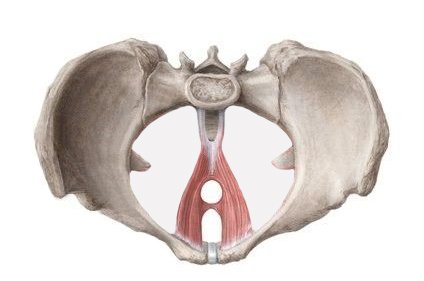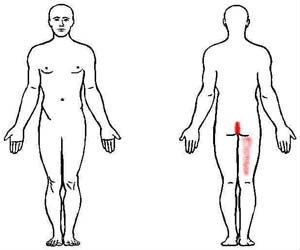Back
Levator Ani Syndrome: Pain in the Rectum
By Shannon Strauch, PTA, STMT-1 on 1/4/2024

Levator ani syndrome (LAS) is a chronic condition characterized by recurring episodes of discomfort or pain in the rectum or pelvis. It is considered a functional gastrointestinal disorder and is often associated with pelvic floor dysfunction. The pelvic floor is a group of muscles that support the pelvic organs, including the rectum.

(Levator ani syndrome trigger point and referral pattern)
Here are some key points about levator ani syndrome:
Symptoms:
The primary symptom of levator ani syndrome is chronic or recurring pain in the rectum or pelvis. The pain is typically described as a dull ache or pressure and may be aggravated by sitting. The discomfort is often relieved by standing or lying down.Trigger Factors:
Certain activities, such as sitting for prolonged periods, bowel movements, or sexual activity, can trigger or worsen the symptoms.Pelvic Floor Dysfunction:
Levator ani syndrome is believed to be associated with dysfunction of the pelvic floor muscles, specifically the levator ani muscles. These muscles may become tense or spasmodic, contributing to the pain.Diagnosis:
Diagnosing levator ani syndrome involves a thorough medical history, physical examination, and the exclusion of other potential causes of pelvic pain. Tests such as imaging studies or endoscopy may be performed to rule out other conditions.Treatment:
Management of levator ani syndrome often involves a multidisciplinary approach. Treatment options may include pelvic floor physical therapy, relaxation techniques, biofeedback, and medications to relieve muscle spasms or pain. Lifestyle modifications, such as avoiding triggers, maintaining good bowel habits, and managing stress, may also be recommended.Psychological Factors:
Stress, anxiety, and psychological factors can play a role in the development and exacerbation of levator ani syndrome. Addressing these factors through counseling or stress management techniques may be part of the treatment plan.
It's essential for individuals experiencing symptoms suggestive of levator ani syndrome to seek evaluation and guidance from a healthcare professional. A comprehensive assessment can help determine the appropriate treatment approach tailored to the individual's specific needs and symptoms. If you suspect you may have levator ani syndrome, it's advisable to consult with a gastroenterologist or a healthcare provider specializing in pelvic floor disorders.
Read More:
Dry Needling for C-Section Scars and Postpartum Recovery By Dr. Christine Martirez PT, DPT on 10/15/2024 Learn how dry needling can be used for c-section scars and c-section recovery How Red Light Therapy Can Be Used to Treat Pelvic Floor Dysfunctions By Dr. Christine Martirez PT, DPT on 10/15/2024 Learn about red light therapy and how it can be used to treat pelvic floor dysfunctions
Are you ready to live pain free?
Request An Appointment